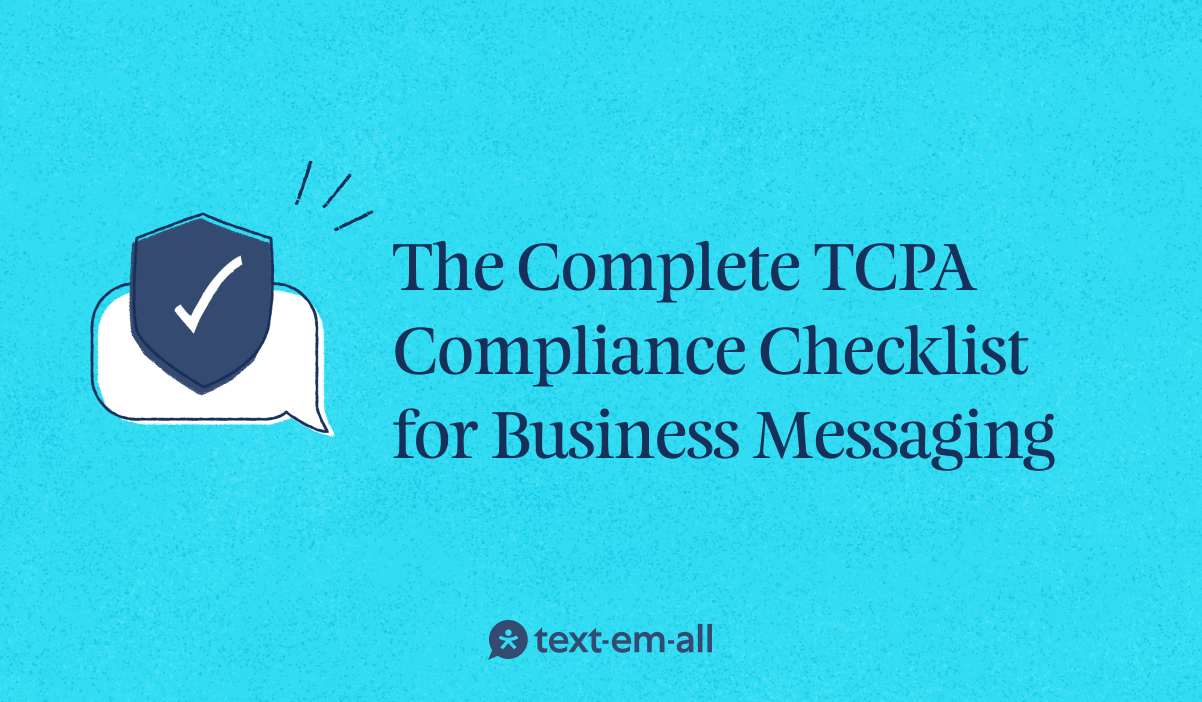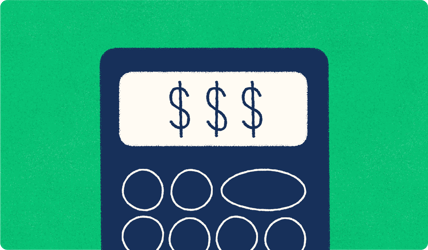
Every organization faces the same tension: how do you reach customers without crossing legal or ethical lines? The Telephone Consumer Protection Act (TCPA) sets the ground rules for responsible communication. It defines when, how, and to whom you can send messages. Following those rules isn’t just about avoiding fines; it’s about building trust. This guide breaks down a practical SMS compliance checklist and shows how to choose an SMS platform that makes compliance easy. While it’s not legal advice, it’s grounded in real-world best practices and the same industry standards recognized by the Federal Communications Commission (FCC) and CTIA.
Text-Em-All’s mass texting service for businesses was built around one simple belief: business communication should be effective and ethical. Whether you’re sending promotional texts, alerts, or reminders, the right platform should help you do both confidently.
What is TCPA, and why does it matter?
The Telephone Consumer Protection Act (TCPA) is a U.S. law that protects consumers from unwanted calls and texts. It requires businesses to obtain consent before sending promotional messages, honor opt-outs, and send messages only during approved hours (typically 8 a.m. to 9 p.m. local time).
TCPA compliance applies to both marketing and informational texts. That means your weekly sale announcement and your appointment reminder both fall under its scope, though the level of consent required differs.
At its core, TCPA is about respect. It ensures customers hear from businesses they trust, not ones they didn’t agree to hear from.
For a deeper look at how consent, opt-ins, and message types work, see our full guide on SMS compliance and consent.
Exceptions to TCPA regulations
Some types of messages are exempt from certain TCPA requirements, but “exempt” doesn’t mean “anything goes.”
Common exceptions include:
- Emergency alerts: Weather warnings, public safety notifications, and other critical messages.
- Transactional messages: Delivery confirmations, password resets, or account notices.
- Nonprofit and school communications: Messages that share essential information rather than solicitations.
Even these messages should follow best practices like clear identification, proper timing, and an easy opt-out. Carriers still monitor for spam-like behavior, and adhering to TCPA principles reduces the chance of your texts being filtered or blocked.
Text-Em-All supports both emergency and informational messaging, helping organizations communicate responsibly without risking compliance violations.
Your complete TCPA compliance checklist
Use this TCPA compliance checklist to confirm your texting strategy aligns with rules and carrier standards:
- Obtain express written consent for all promotional or marketing messages.
- Identify your organization clearly in every message.
- Include an opt-out option, such as “Reply STOP to unsubscribe.”
- Send messages only during approved hours (8 a.m. – 9 p.m. local time).
- Maintain detailed records of consent for at least four years.
- Honor opt-outs immediately, don’t delay or reconfirm.
- Use registered 10DLC or toll-free numbers for business texting to reduce carrier blocking.
- Avoid prohibited or misleading content, including false claims or offensive material.
Many compliance-focused platforms automate these steps for you. For instance, Text-Em-All automatically handles opt-outs and supports quiet-hour enforcement to reduce risk and simplify compliance.
What to look for in SMS platforms to simplify compliance
Not every SMS provider makes compliance easy. Some give you the tools but leave compliance up to your team. Others, like Text-Em-All, build safeguards directly into the platform.
When choosing an SMS platform, look for:
- Automatic opt-out handling: STOP/UNSUBSCRIBE replies processed instantly.
- Consent collection and storage: Built-in consent fields or integrations with CRM systems.
- Quiet-hour controls: Prevents messages from being sent after hours.
- Campaign labeling: Lets you mark messages as marketing or informational.
- Template controls: Ensures each message includes proper identification and disclosure.
- Compliance reporting: Delivery logs and opt-out summaries for audits.
- Multi-channel support: Combine text and voice for essential updates.
These features reduce manual oversight, minimize legal exposure, and keep your brand’s messaging transparent and trustworthy.
Which SMS platforms make TCPA compliance easiest?
Every SMS service offers similar basics: contact lists, templates, scheduling, etc. However, only a few truly prioritize compliance. Here’s how the most recognized providers compare, based on publicly available features and user experience.
Text-Em-All: best for compliance-first business texting
Built for organizations that value reliability and responsibility. Text-Em-All includes:
- Automatic STOP handling to honor opt-outs instantly.
- Time-of-day controls to avoid late-night sends.
- Consent management tools for auditing.
- Real-time reporting for delivery and opt-outs.
- Pay-as-you-go pricing with no hidden fees.
EZ Texting
EZ Texting offers simple templates and keywords for promotions. It’s strong on marketing automation but has limited built-in compliance reporting, making it better suited to seasoned marketing teams that already manage consent externally.
SimpleTexting
SimpleTexting integrates easily with CRMs and marketing tools. However, users must manually manage consent and quiet hours, which can complicate compliance for larger teams.
Twilio
Twilio offers flexibility through APIs and global reach. It’s great for organizations with development resources, but compliance safeguards must be coded and maintained manually.
| Platform | Auto Opt-Out | Consent Tools | Quiet Hours | Compliance Reporting | Multi-Channel | Best For |
|---|---|---|---|---|---|---|
| Text-Em-All | ✓ | ✓ | ✓ | ✓ | ✓ | Reliable, compliant business texting |
| EZ Texting | ✓ | ✓ | ✗ | ✗ | ✗ | Marketing-heavy outreach |
| SimpleTexting | ✓ | ✓ | ✗ | Limited | ✗ | Automation-driven marketing |
| Twilio | ✗ | ✗ | ✗ | ✗ | ✓ | Developer-led solutions |
All these tools can send texts effectively, but Text-Em-All stands out for making compliance simple through automation and transparent design.
Which types of platforms to avoid
Not every SMS tool is built with compliance in mind. Some platforms focus almost entirely on marketing reach and automation—great for engagement, but risky if they don’t enforce the right safeguards.
When evaluating vendors, be cautious if a platform:
- Lacks built-in opt-out handling or makes users manually process STOP requests.
- Allows unrestricted sending hours, including overnight or across time zones.
- Doesn’t verify consent before sending bulk campaigns.
- Offers little or no compliance reporting, making it hard to prove consent or audit message history.
- Emphasizes growth over guardrails, encouraging aggressive campaigns that could violate carrier or TCPA rules.
These gaps don’t necessarily mean a provider is “bad”, but they put the burden entirely on your team. Choosing a platform that automates compliance gives you more protection, consistency, and peace of mind.
Best practices for maintaining TCPA compliance
TCPA compliance isn’t a one-time task; it’s an ongoing process that evolves as technology and regulations change. Reviewing how you communicate, keeping your messages transparent, and choosing a trustworthy platform are crucial to staying TCPA-compliant.
1. Review how you communicate
Regularly audit message content and delivery timing. Confirm that lists are segmented correctly (marketing vs. informational) and that contacts have the right level of consent.
2. Keep messages transparent and respectful
Avoid language that feels deceptive or overly urgent. Clear, honest communication protects your reputation and aligns with CTIA principles for responsible messaging.
3. Choose a platform that prioritizes compliance
A platform should help you stay compliant, not leave you guessing. Text-Em-All’s mass texting service includes STOP automation, quiet-hour controls, and delivery reporting—all built to support your long-term compliance strategy.
How Text-Em-All ensures TCPA compliance
Text-Em-All’s infrastructure is designed around reliability, compliance, and respect for recipients. Here’s how it helps organizations maintain TCPA compliance effortlessly:
- Automated opt-out handling: STOP and UNSUBSCRIBE requests processed instantly.
- Time-of-day sending controls: Messages only send during compliant hours.
- Consent management: Simple tools to track and store permissions.
- Toll-free verification & 10DLC registration: Builds carrier trust and reduces filtering.
- Transparent analytics: Delivery, response, and opt-out metrics for auditing.
In short: Text-Em-All gives you peace of mind that your messages reach people—and respect their privacy along the way.
Start sending TCPA-compliant messages confidently with Text-Em-All’s mass texting service.












